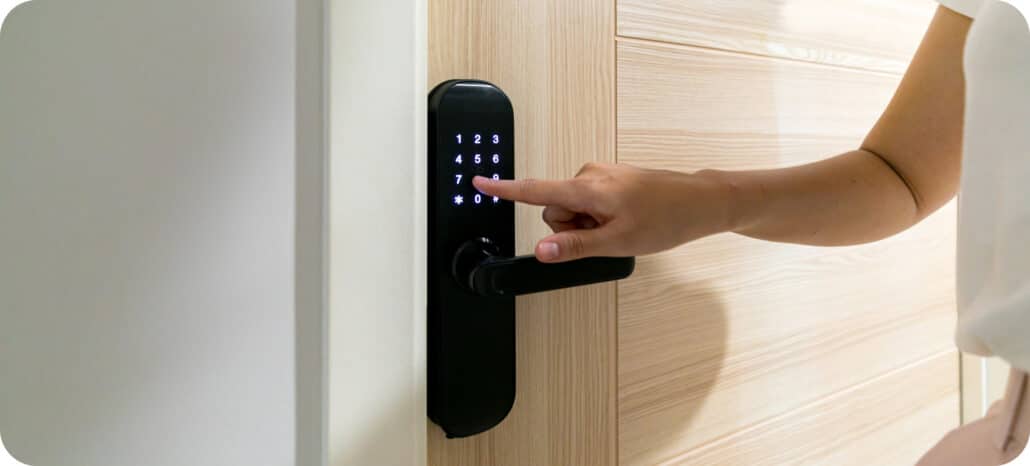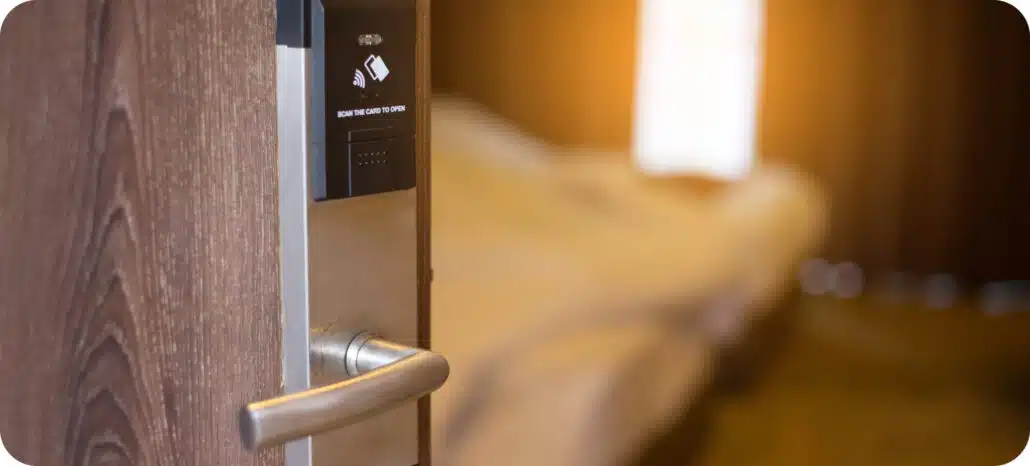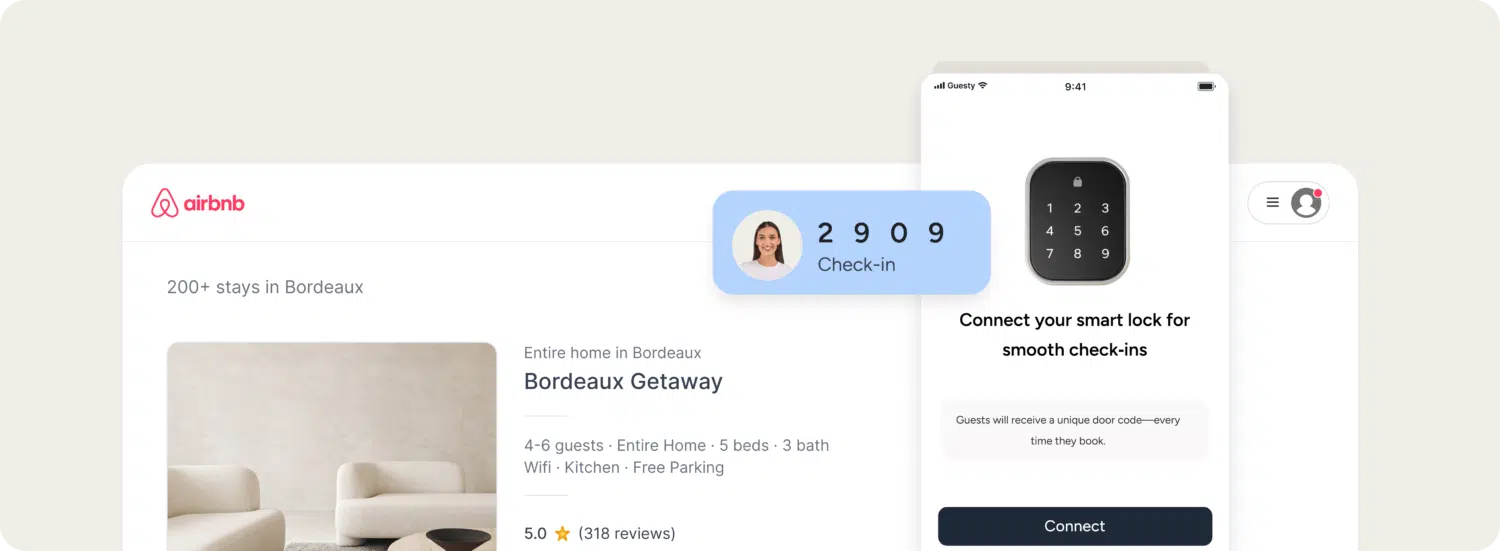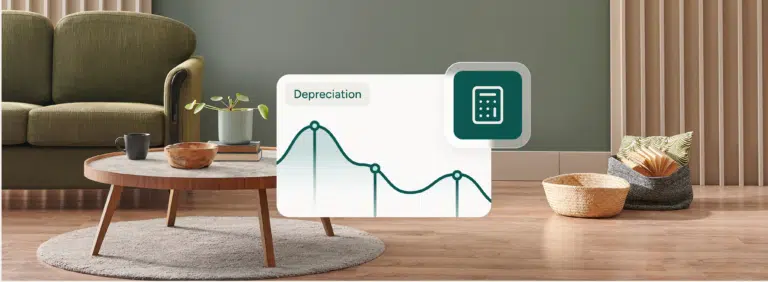In the world of short-term rentals and vacation properties, a smooth Airbnb key exchange can make or break your guest’s experience. As an Airbnb host or property manager, mastering the art of key exchanges and self check-in is crucial for your success.
This guide will walk you through everything you need to know about lockboxes for keys, smart locks, and other innovative solutions to make sure key exchanges happen easily and seamlessly, every time.
Key handoff strategies: Finding your perfect fit
When handing over the Airbnb key to your guests, there are two main approaches: remote and in-person. Let’s explore both options to help you decide which works best for your property.
Remote key exchanges
Remote key exchanges have become increasingly popular, especially in the era of contactless interactions. This method allows guests to access your property without meeting you in person.
Remote exchanges offer flexibility for both hosts and guests, reduce time commitments for property managers, and enhance safety during health-conscious times. However, they may require some initial setup investment and could potentially face technical issues.
Popular remote key exchange methods include lock boxes, smart locks, and keypads, which allow you to securely store keys or provide access codes, ensuring your Airbnb guests can easily enter the property upon arrival.
In-person meeting
While less common in today’s digital age, meeting guests in person to transfer keys is still an option for some hosts. This method provides a personal touch and the opportunity to build rapport, allows for a property tour, and enables immediate resolution of any initial concerns.
However, it can be time-consuming, especially for hosts managing multiple properties, and may lead to scheduling conflicts. If you choose this method, be punctual and professional, prepare a brief welcome packet with essential information, and always have a backup plan in case of delays.
Consider suggesting a meeting point within walking distance of your property for convenience.
The essentials of effortless self check-in
Self check-in has revolutionized the short-term rental industry, offering convenience for both hosts and guests. Let’s dive into what it entails and how it can benefit your Airbnb business.
What is self check-in
Self check-in allows guests to access your rental property independently, without the need for a host to be present. This system typically involves a secure method for retrieving keys or entering the property, such as a lock box for keys or a smart lock with a unique access code. For hosts, self check-in saves time, increases flexibility in check-in times, and reduces operational costs, especially for those managing multiple properties. Guests benefit from the convenience and autonomy, with no pressure to arrive at a specific time and privacy from the moment of arrival.
To sum up, here are the top 5 benefits of efficient key exchanges:
- Increased guest satisfaction and positive reviews
- Time savings for hosts and property managers
- Enhanced security through controlled access
- Flexibility for guests with late arrivals or unconventional schedules
- Reduced operational costs in the long run
Buzzer options for self check-in
For properties in buildings with secure entry systems, buzzer options can facilitate the self check-in process. These may include traditional intercoms, video intercoms, or smart intercoms with mobile app integration.
Some modern buzzer systems can be integrated with your property management system, allowing for temporary access codes to be generated for each guest’s stay and providing real-time monitoring and control for property managers.
By implementing an efficient buzzer system, you can provide a seamless entry experience for your Airbnb guests while maintaining building security.
Tech-savvy solutions for hassle-free key exchanges
The essence of a successful self check-in system lies in choosing the right key exchange method. Let’s explore the various options available to Airbnb hosts and property managers.
Key categories

When it comes to keys, hosts have several options to choose from. Traditional metal keys are familiar to all guests and require no tech, but they can be lost or copied and usually require physical handover.
Digital keys, accessed via mobile apps, offer convenience and can be revoked remotely, but require guests to have compatible smartphones. Smart locks, which are WiFi or Bluetooth-enabled, provide high security and can generate temporary codes, though they come with an initial cost and potential for tech issues.
Lastly, keypads offer easy code entry without physical keys, but codes must be changed regularly for security. When choosing between these options, consider factors such as your property type, guest demographics, and personal management style.
Many vacation rental hosts find that a combination of methods, such as a smart lock with a physical key backup, provides the best balance of convenience and security.
Third-party key exchange services
For hosts looking to further streamline their key exchange process, a key exchange service can be a valuable resource. Popular options include KeyNest, Keycafe, and HelloGuest. These services typically work by storing keys in secure locations such as cafes, shops, or dedicated kiosks.
Guests receive a unique code to retrieve the keys, and the service tracks key pickups and returns. This approach is particularly convenient for properties in busy urban areas, allows for key exchanges outside of regular business hours, and provides an additional layer of security and accountability.
When considering an exchange service, be sure to factor in the additional cost and ensure that the pickup location is conveniently located in relation to your property.
The art of clear guest instructions
Clear communication is key to a smooth check-in process. Here’s how to ensure your guests have all the information they need before arrival.
Pre-arrival communication

To ensure clear and timely communication, send check-in instructions at least 24 hours before the guest’s arrival. Use a friendly, welcoming tone, provide step-by-step directions, and include photos or videos if helpful.
Essential information to provide guests before their stay includes:
- The exact property address with any tricky navigation tips
- Check-in and check-out times
- Detailed instructions for accessing the property
- WiFi password and other essential property information
- Your contact information for emergencies
If you’re using a key exchange service, clearly explain where and how keys are collected. By providing comprehensive information upfront, you can minimize confusion and ensure a positive start to your guests’ stay.
Troubleshooting tips for smooth key handoffs
Even with the best-laid plans, issues can happen. Being prepared to handle common problems quickly and efficiently is crucial for maintaining positive guest experiences.
Common problems and solutions
Common issues include broken keys, lost keys, and forgotten passcodes. For physical keys, keep a spare with a trusted neighbor or at a secondary secure location. To prevent key loss, attach keys to large, distinctive keychains.

For forgotten passcodes, provide an alternative contact method for guests to retrieve the code. As you go through the process of resolving the issue, stay calm and reassure the guest, verify they’re at the correct property, ask them to double-check all provided information, and offer step-by-step guidance over the phone if needed.
Have a backup plan, such as a local contact who can assist in person, and be prepared to provide alternative accommodation if all else fails.
Streamlining your key exchange process with Guesty
For property managers and Airbnb hosts looking to take their key exchange process to the next level, Guesty offers powerful tools to streamline operations and enhance guest experiences.
Guesty’s features include:
- Integration with popular smart lock systems
- Automated messaging to send check-in instructions
- Guest verification and digital guidebook creation
These tools can significantly reduce the time spent on manual key exchanges, improve security with temporary access codes, and enhance guest satisfaction through smoother check-ins.
Moreover, Guesty’s channel manager capabilities allow you to synchronize your listings across multiple platforms, ensuring that your key exchange information is consistent and up-to-date everywhere your property is listed.
This integration with your property management system can save you time and reduce the risk of double bookings or miscommunication about key exchange procedures.
For more insights on optimizing your Airbnb operations, check out our guides on creating a fantastic short-term rental welcome book and managing challenging guests.
To learn more about how Guesty can revolutionize your key exchange process and overall property management, visit our features page.
7 must-have features in a smart lock for vacation rentals
- Remote access control
- Temporary code generation
- Activity logs and alerts
- Battery backup
- Weather-resistant design
- Integration with property management software
- User-friendly guest interface
Quick troubleshooting steps for common key exchange issues
- Verify guest location and property details
- Resend access information via alternative methods
- Offer remote guidance and support
- Activate backup access methods if available
- Contact local support personnel if necessary
- Provide alternative accommodation as a last resort
- Follow up with the guest to ensure resolution and satisfaction
For additional insights on improving your guest experience, including smooth check-ins, visit Airbnb’s resource center.





